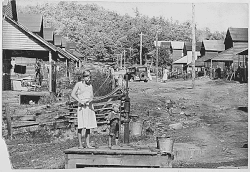From Wikipedia, the free encyclopedia
Dichotomy
 Historians have questioned whether the New Deal in the US is best seen as a decisive change or more as being a case of societal continuity in the context of
American history
. The picture shows two children pumping water by hand. This was the sole water supply in this section of
Wilder, Tennessee
in 1942)
Historians have questioned whether the New Deal in the US is best seen as a decisive change or more as being a case of societal continuity in the context of
American history
. The picture shows two children pumping water by hand. This was the sole water supply in this section of
Wilder, Tennessee
in 1942)
Change and continuity
is a classic
dichotomy
within the fields of
history
,
historical sociology
, and the
social sciences
more broadly. The question of change and continuity is considered a classic discussion in the study of historical developments.
[1]
The dichotomy is used to discuss and evaluate the extent to which a historical development or event represents a decisive historical change or whether a situation remains largely unchanged. A good example of this discussion is the question of how much the
Peace of Westphalia
in 1648 represents an important change in
European history
. In a similar vein, historian
Richard Kirkendall
once questioned whether
FDR
's
New Deal
represented "a radical innovation or a continuation of earlier themes in American life?" and posed the question of whether "historical interpretations of the New Deal [should] stress change or emphasize continuity?"
[2]
The issue here is if the New Deal marks something radically new (
change
) in US history or if the New Deal can be understood as a continuation (
continuity
) of tendencies in American history that were in place well before the 1930.
The dichotomy is important in relation to constructing, discussing, and evaluating historical
periodizations
. In terms of creating and discussing periodization (e.g.
the Enlightenment
or
the Victorian Era
,) the dichotomy can be used to assess when a period can be said to start and end, thus making the dichotomy important in relation to understanding historical
chronology
. Economic historian
Alexander Gerschenkron
has taken issue with the dichotomy, arguing that continuity "appears to mean no more than absence of change, i.e. stability."
[3]
German historian
Reinhart Koselleck
, however, has been said to challenge this dichotomy.
[4]
Notes
[
edit
]
- ^
Jørn Henrik Petersen og Klaus Petersen. "
Præsentation: Dansk velfærdshistorie.
"
Historisk Tidsskrift
(Denmark), bind 110, hæfte 1, s. 217.
- ^
Richard Kirkendall. "The New Deal As Watershed: The Recent Literature."
The Journal of American History
Vol. 54, No. 4 (1968), pp. 839.
- ^
Alexander Gerschenkron. "On the Concept of Continuity in History."
Proceedings of the American Philosophical Society
Vol. 106, No. 3 (Jun. 29, 1962), pp. 195?209.
- ^
Reinhardt Koselleck (2006) "Conceptual History, Memory, and Identity: An Interview with Reinhart Koselleck." Interview by Javier Fernandez Sebastian and Juan Francisco Fuentes
Contributions to the History of Concepts
Vol. 2, pp. 110?12.
|
|---|
|
| Primary
| |
|---|
| Interdisciplinary
| |
|---|
| List
| |
|---|
| Other categorizations
| |
|---|
|
|
|---|
|
|
|
|---|
| By scale
| |
|---|
| By source
| |
|---|
| By topic
| |
|---|
|
|
|
|
By country or region
|
|---|
| Africa
| |
|---|
| Americas
|
|
|---|
| Eurasia
|
|
|---|
| Oceania
| |
|---|
|
|
|
|
|
Organizations, publications
|
|---|
|
|
|
|
|
|---|
| Disciplines
|
|
|---|
| Themes
| |
|---|
| Journals
| |
|---|
| Academia
| |
|---|
| Related
| |
|---|